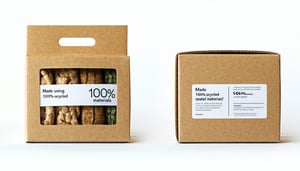In recent years, more and more industries have been looking at waste differently: not as something to simply get rid of, but as a resource waiting to be transformed. This is the idea behind upcycling – taking materials others have discarded and creatively turning them into something of higher quality or greater value. Likewise, we see upcycling as much more than a passing trend. It’s an intelligent approach to packaging that marries environmental responsibility with real innovation.
Turning Discarded Materials into Something Worthwhile

While traditional recycling plays its part, it often involves breaking materials down, which can sometimes mean a loss of quality. Upcycling approaches this differently. Rather than downgrading materials, it finds ways to repurpose them. For example, old cardboard boxes can be smartly reshaped into protective inserts or edge guards. Tough textiles or mixed plastics (which might otherwise end up in a landfill) can be made into durable, reusable new solutions like pallet wraps or heavy-duty sacks.
We're also seeing exciting innovation in using agricultural or industrial side streams. Think packaging grown from mushroom mycelium using farm waste, or tough boards built from leftover grains. These materials are born from resources previously overlooked, adding more depth to the sustainability initiative as a whole.
Why Upcycling Makes Good Business Sense

Want even more value from your sustainability? Choosing upcycled packaging is a smart business move, too. Companies using these materials can stand out and connect with customers who prioritise environmental values. Upcycled materials often come with a compelling backstory that adds an authentic, ethical appeal to your product. Packaging that proudly declares "Made using 100% upcycled materials" is only going to increase in demand, and it speaks volumes about your drive to operate with a circular approach.
Sourcing upcycled materials often means working locally, which can help reduce transport emissions and strengthen relationships within the local community. It creates a positive ripple effect of sustainability throughout your supply chain.
The Environmental Difference

At this point, the positive impact is evident. Upcycling reduces our reliance on extracting brand-new resources, eases the burden on landfills, and frequently requires less energy than conventional recycling. It's a key part of shifting from the old linear "take-make-dispose" system to a circular economy, where materials are kept in use, adding value time and time again.
We're enthusiastic supporters of this change, partnering with manufacturers and innovators who are leading the way in upcycled packaging. We're seeing strong interest in options that don't just protect goods effectively, but also help protect our shared environment.
Is your business considering a move towards more sustainable packaging? We'd love to discuss your next packaging project.
Contact us today by sending a message, emailing sales@allpack.uk.com, or calling 01543 396 700 to explore solutions tailored to your business.